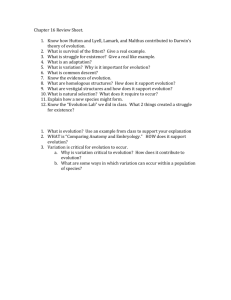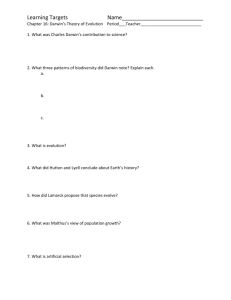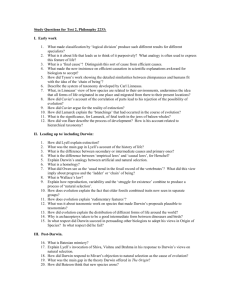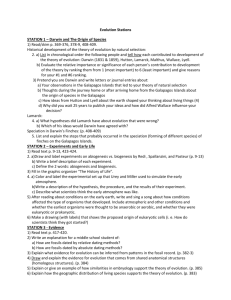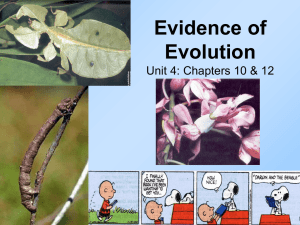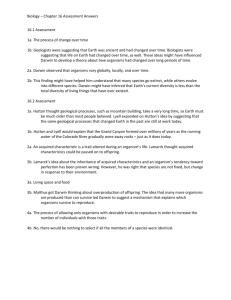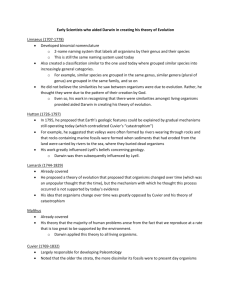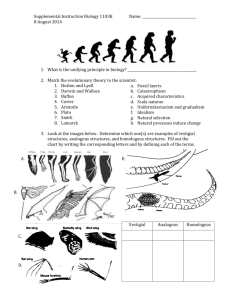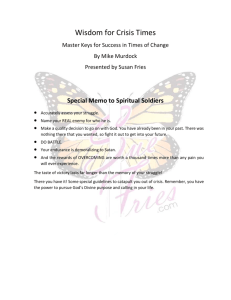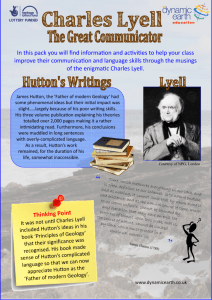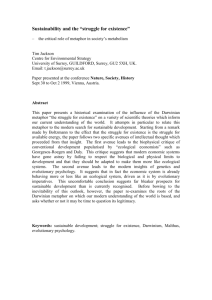Chapter 1
advertisement
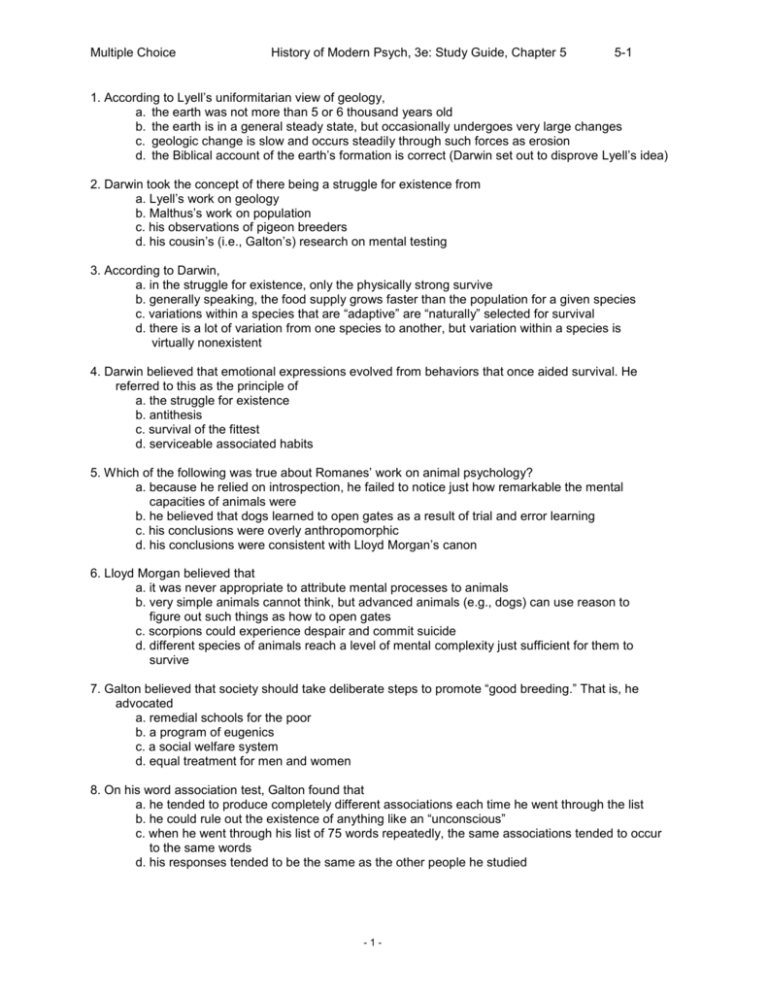
Multiple Choice History of Modern Psych, 3e: Study Guide, Chapter 5 5-1 1. According to Lyell’s uniformitarian view of geology, a. the earth was not more than 5 or 6 thousand years old b. the earth is in a general steady state, but occasionally undergoes very large changes c. geologic change is slow and occurs steadily through such forces as erosion d. the Biblical account of the earth’s formation is correct (Darwin set out to disprove Lyell’s idea) 2. Darwin took the concept of there being a struggle for existence from a. Lyell’s work on geology b. Malthus’s work on population c. his observations of pigeon breeders d. his cousin’s (i.e., Galton’s) research on mental testing 3. According to Darwin, a. in the struggle for existence, only the physically strong survive b. generally speaking, the food supply grows faster than the population for a given species c. variations within a species that are “adaptive” are “naturally” selected for survival d. there is a lot of variation from one species to another, but variation within a species is virtually nonexistent 4. Darwin believed that emotional expressions evolved from behaviors that once aided survival. He referred to this as the principle of a. the struggle for existence b. antithesis c. survival of the fittest d. serviceable associated habits 5. Which of the following was true about Romanes’ work on animal psychology? a. because he relied on introspection, he failed to notice just how remarkable the mental capacities of animals were b. he believed that dogs learned to open gates as a result of trial and error learning c. his conclusions were overly anthropomorphic d. his conclusions were consistent with Lloyd Morgan’s canon 6. Lloyd Morgan believed that a. it was never appropriate to attribute mental processes to animals b. very simple animals cannot think, but advanced animals (e.g., dogs) can use reason to figure out such things as how to open gates c. scorpions could experience despair and commit suicide d. different species of animals reach a level of mental complexity just sufficient for them to survive 7. Galton believed that society should take deliberate steps to promote “good breeding.” That is, he advocated a. remedial schools for the poor b. a program of eugenics c. a social welfare system d. equal treatment for men and women 8. On his word association test, Galton found that a. he tended to produce completely different associations each time he went through the list b. he could rule out the existence of anything like an “unconscious” c. when he went through his list of 75 words repeatedly, the same associations tended to occur to the same words d. his responses tended to be the same as the other people he studied -1- Multiple Choice History of Modern Psych, 3e: Study Guide, Chapter 5 5-2 Answers 1. a. this was the estimate made by those advocating a catastrophic model of geological change b. this is also the catastrophist view c. CORRECT ANSWER – change occurs according to “uniform” principles d. Lyell’s model contradicted the Biblical view 2. a. Darwin was influenced greatly by Lyell, but did not take the “struggle” concept from him b. CORRECT ANSWER – Malthus argued that such a struggle was the inevitable result of population growth outpacing food supplies c. from his breeder friends, with their artificial selection to bring about change, he saw an analogy to natural selection d. nothing relating to a “struggle” here 3. a. any attribute that makes the organism more adaptable will be selected for, not just strength (e.g., camouflage) b. the opposite is true, a notion Darwin learned from reading Malthus c. CORRECT ANSWER – the essence of natural selection d. variation within a species is essential for natural selection to be able to work 4. a. this is a phrase taken from Malthus, unrelated to emotional expression b. this is a idea that opposite emotions are displayed in opposite ways (e.g., dominance and submission in dogs) c. this is the basic idea that those best suited for survival will continue as species d. CORRECT ANSWER – for example, the expression of disgust was said to derive from the reaction one makes to spoiled food 5. a. he did not use introspection b. he would have attributed greater abilities to the dog (e.g., the ability to reason) c. CORRECT ANSWER – he had a tendency to attribute human characteristics to animals d. his explanations tended to be anything but parsimonious 6. a. such attribution was OK, depending on the level of ability needed to survive b. he would not attribute such skills to dogs c. this is more like what Romanes said (and is overly anthropomorphic) d. CORRECT ANSWER – and this allows for a relatively high level of cognition, if necessary 7. a. he was not in favor of aid for the poor (it would just increase the number of poor people, he thought) b. CORRECT ANSWER – selective breeding for intellect c. same as alternative a. d. he believed women to be intellectually inferior to men 8. a. the opposite – there tended to be repetitions b. in fact, he thought an unconscious had to exist c. CORRECT ANSWER – this happened about 25% of the time d. he only studied his own associations -2-
